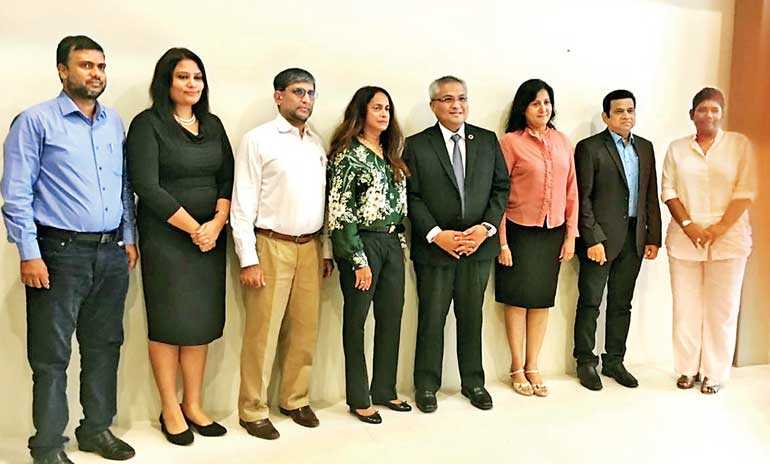Friday Feb 20, 2026
Friday Feb 20, 2026
Monday, 25 November 2019 01:10 - - {{hitsCtrl.values.hits}}

From left: Dynawash Head of Business Ishfaq A. Cader, Unilever Sri Lanka Country Corporate Communications and Sustainability Lead Mayanthi Wickremetilleke, Dynawash CEO Shahid Sangani, Dynawash Director Roshini Sangani, Unilever Sri Lanka Chairman Carl Cruz, SLINTEC Senior Research Scientist Prof. V.M. Thadhani, Unilever Sri Lanka Director, Supply Chain Gerard Irudayaraj, and Unilever Ceytea Instant Tea Factory, Sri Lanka Factory Manager Anusha Kotalawala
Green manufacturing is more than a phraseology for Sri Lankan Institute of Nanotechnology SLINTEC, and a great deal of research has been undertaken on Natural Dyes.
A project on dye from tea waste headed by SLINTEC Senior Research Scientist Prof. Vinitha M. Thadhani has enabled PECL, Unilever, and DYNAWASH to obtain Best Sustainability Project Awards 2019 awarded by The Ceylon Chamber of Commerce.
The textile dyes market size is projected to grow from $ 8.2 billion in 2019 to $10.9 billion by 2024, at a CAGR of 5.9%, during the forecast period. However, the growing evidence against harmful effects and rising concerns toward protection of the environment, from the use of synthetic dyes is fuelling the growth of the natural dye segment in the global market, which is anticipated to generate revenues of approximately $5 billion by 2024, growing at a CAGR of around 11% during 2018-2024.
Natural dyes, which come mostly from plants, require arable land to produce the base material. It has been reported that, 13 acres of land is needed to grow enough dye for one acre of cotton. Other challenges include, limited colour palette, supply chain, reproducibility of the natural dye to give consistency in colour shade, and poor light and colour fastness. Therefore, catering to the urgent demand for a cost effective natural dying process which can satisfy the demands of the commercial textile industry, a team headed by Prof. Vinitha M. Thadhani of Sri Lankan Institute of Nanotechnology, and Prof. Gehan Amaratunga, of Department of Engineering, University of Cambridge, have developed a bio-refinery process, to utilise the tea waste, generated during instant tea manufacturing process as a natural colouring agent for fabric.
Sri Lanka exports on average, 330,000 MT of high quality, black tea each year, and during the process, 20,000 MT quantity of tea rejects namely BMF (Broken Mixed Fannings); small bits of tea that are left over after higher forms of tea leaves are gathered. Approximately 10,000 MT of this BMF is used to generate instant tea, at Unilever, Ceytea Instant tea plant, which is the main sourcing unit on the world instant tea market, accounting for close to 70% of the global supply of the Ready to Drink volumes sourced from Pepsi Lipton International. During the instant tea manufacturing process, around 20 MT of dry tea waste is generated each day. The objective of the developed bio–refinery process, was the convergence purpose, of using the waste of instant tea manufacturer as a raw material for natural dye for the textile industry.
A tri-party agreement was signed between, SLINTEC, PECL (Unilever), and DYNAWASH, where SLINTEC is the research partner, DYNAWASH the commercial partner, and Unilever the supplier of the raw material for dye formation. The project was successful in receiving the Export Development Board Funding in 2017.
The invention has enabled to earn carbon credit by reducing consumption of fossil fuel (petroleum) based synthetic dyes, with reduction in dying time and water consumption from 15-50% depending upon the fabric (cotton, nylon, etc.) Further, unlike synthetic dyes which tend to remain stable to common oxidation and reduction processes as per their designing and so are very difficult to remove from textile industry effluents, the developed natural dying process, involves biodegradable material, without the use of any oxidant or reductant and minimises the environmental impact of wastewater treatment.
The patented, technologically advanced method developed by SLINTEC, to upscale tea waste, for use as a dye will be a stepping stone for all manufacturers to reconsider towards greener technologies, in order to work in a more sustainable manner.